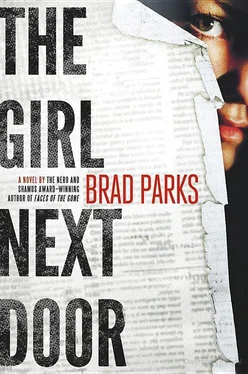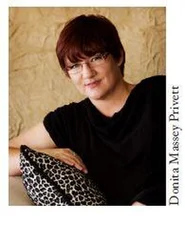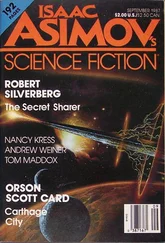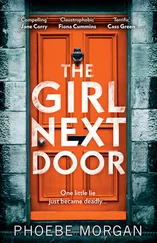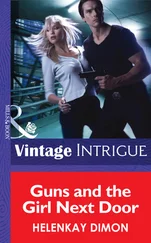Brad Parks - The Girl Next Door
Здесь есть возможность читать онлайн «Brad Parks - The Girl Next Door» весь текст электронной книги совершенно бесплатно (целиком полную версию без сокращений). В некоторых случаях можно слушать аудио, скачать через торрент в формате fb2 и присутствует краткое содержание. Год выпуска: 2012, ISBN: 2012, Издательство: Minotaur Books, Жанр: Триллер, на английском языке. Описание произведения, (предисловие) а так же отзывы посетителей доступны на портале библиотеки ЛибКат.
- Название:The Girl Next Door
- Автор:
- Издательство:Minotaur Books
- Жанр:
- Год:2012
- ISBN:031266768X
- Рейтинг книги:4 / 5. Голосов: 1
-
Избранное:Добавить в избранное
- Отзывы:
-
Ваша оценка:
- 80
- 1
- 2
- 3
- 4
- 5
The Girl Next Door: краткое содержание, описание и аннотация
Предлагаем к чтению аннотацию, описание, краткое содержание или предисловие (зависит от того, что написал сам автор книги «The Girl Next Door»). Если вы не нашли необходимую информацию о книге — напишите в комментариях, мы постараемся отыскать её.
The Girl Next Door — читать онлайн бесплатно полную книгу (весь текст) целиком
Ниже представлен текст книги, разбитый по страницам. Система сохранения места последней прочитанной страницы, позволяет с удобством читать онлайн бесплатно книгу «The Girl Next Door», без необходимости каждый раз заново искать на чём Вы остановились. Поставьте закладку, и сможете в любой момент перейти на страницу, на которой закончили чтение.
Интервал:
Закладка:
“Sorry, I don’t sit in meetings all day where these sorts of things are discussed, remember? You’ll have to enlighten me.”
Tina stared straight ahead for a second, as if she needed to summon the strength to explain it all.
“Gosh, I don’t even know where to start,” she said. “You know we’re losing money, right?”
“Buckets of it, yes.”
“Well, one of the reasons is that a lot of the contracts we signed with our unions date back to better days,” Tina said. “So, for example, even though our revenues have plummeted, the guys who drive our distribution trucks are still working under a collective bargaining agreement that guarantees them a three percent raise.”
“No kidding. Damn, where do I sign up for that ?”
Our newsroom wasn’t unionized. Once upon a time, it hadn’t seemed all that necessary. As reporters and editors, we fancied ourselves highly specialized, highly skilled, highly mobile workers who did not need group representation: if management didn’t keep wages competitive, we would-in the fine tradition of LeBron James-take our talents elsewhere. We told ourselves unions were for auto workers and factory linemen, people who worried their jobs would be outsourced to Bangladesh, not for stars like us.
Then our business collapsed, taking those illusions with it. Suddenly we were no different from employees in any other contracting industry. And we had grown so comfortable during the good ol’ days, we didn’t have any kind of collective bargaining to give us some shred of leverage.
So I hadn’t had a pay raise in six years. The pay cuts started three years ago. And really, I was just happy to have hung on to my job. Szanto and a lot of my other (now former) colleagues weren’t as fortunate.
“Yeah, well, we’ll go out of business if we can’t renegotiate those deals, and Jackman obviously knows that better than anyone,” Tina said. “And it’s not just the drivers. It’s the delivery people, the press operators, pretty much all the unions. None of them want to give in. But they’re also realistic enough to know that if the paper goes under, they won’t have jobs.”
“And a three percent pay raise doesn’t do much for you if you’re no longer getting a paycheck in the first place,” I said.
“Exactly,” Tina said. “So it’s like this big game of chicken. We tell them we need concessions. They say they’ll go on strike if we keep pressing for them. We say we’ll go out of business if we don’t get them. And round and round it goes.”
The audience was getting settled in, as were the musicians, who were fiddling with their instruments and readying themselves for the appearance of their concertmaster and conductor.
“I guess it just bothers me that all I ever hear about is how we need to cut costs. You never hear about new revenue initiatives,” I said, as a drummer tested the timpani. “It’s going to take a pretty bright person to figure out how a newspaper can monetize the Web, and I don’t have a lot of confidence Jackass is the guy.”
Just then, as if on cue, Jackman came stumbling down the aisle toward us. He was being loosely steered by an usher, who led him to a row two ahead of ours, where there was just one empty seat. Naturally, it was in the middle of the row. And Jackman, whose dexterity was several scotches behind him, began falling over people on his way toward it.
“Jackass is made of tougher stuff than you think,” Tina said, keeping her voice lower now that he was in the vicinity. “I know he plays the part of the dandy. But at the paper he worked at in Michigan, he pretty much broke one of the unions he was negotiating with. He just refused to blink. Supposedly it got pretty nasty.”
“Nasty … how?”
“Well, he bashed some guy’s brains in, for one.”
“What!”
“I’ve heard this story from a few people, so I’m pretty sure it’s true. The union was trying to intimidate Jackass and sent some muscle to his country club, just to scare him, show him they meant business. The story I heard is that Jackman took a seven-iron and buried it in the guy’s skull.”
“Holy crap! Didn’t he face assault charges or anything?”
“Apparently the guy who came at him was carrying a concealed gun. He hadn’t pulled it, but it was on him, so Jackman was able to claim self-defense, and his golfing buddies backed him up. There were no charges.”
I shook my head as I watched Jackman find his seat and sink heavily into it.
“All I’m saying is, don’t underestimate Gary Jackman,” Tina finished. “The man has brass balls.”
I was about to comment on Jackman’s balls when suddenly, from two rows ahead of us, there was a commotion. A woman let out a horrified shriek. Two men jumped up from their seats, as if there were debris falling on them from above. Another man stood up and was staring down at a whitish mess dripping from his tuxedo pants. It was difficult at first to discern what, exactly, had happened.
Then it all became clear: Gary A. Jackman, the Newark Eagle-Examiner’ s dandy, brass-balled publisher, had thrown up on the guy next to him.
* * *
Once Jackman was escorted out and order was restored, the actual performance began and things got a lot less interesting. The orchestra was from somewhere in Europe-the Netherlands, perhaps, or maybe Belgium … I honestly don’t know how anyone (besides the Dutch and the Belgians) keeps those two countries straight.
After the first piece, Tina was chirping about how some well-respected music magazine-not Rolling Stone, apparently-had named the orchestra the best in the world. They certainly passed the Carter Ross Classical Music Test: I drifted off during the first movement of the second piece. Call me boorish or uncultured, but I’ve always found falling asleep at the symphony to be one of life’s greater pleasures. And if you look around at any of your finer concert halls, you’ll see I’m not alone.
At intermission-or, as I delighted in calling it, “halftime”-I convinced Tina we had received enough refinement for one night and that, as newspaper people, it was time to get back in touch with our more populist roots. So we snuck out and made our way down the street to Kilkenny Alehouse, a comfortable establishment with a beautiful wooden bar, an array of flat-screen televisions, and a plethora of beer on tap. My kind of place.
Tina stuck with white wine as I bounced between ales. We put away several rounds, yammering about the miserable state of our chosen profession. But, at the same time, Tina and I had long since decided that if the ship was going to take us down, we might as well keep dancing on the decks until it slipped under the water.
Then we started trading war stories, remembering our brushes with disaster, recounting our triumphs. Even though the bar was all but empty on a Monday night, Tina and I had pulled our chairs together as if a crowd of people had forced us into close quarters. The contact was delicious. Tina’s legs kept brushing against mine. Her hands took turns resting on various parts of my person. And her brown eyes, which had gone just slightly watery as a result of the wine, glowed with particular intensity.
I wasn’t sure how many hours had passed by the time we teetered out. But a hot July day had given way to a pleasant, temperate summer evening. The air was so perfect-neither too hot nor too cold-it was almost like it didn’t exist. And a nearly full moon hung above us, large and lanternlike.
As we made our way down the street, toward a car neither of us had any business driving, Tina had draped herself on my right side, with one arm wrapped tightly around mine and a hand on my chest.
The next thing I knew, we had veered into the darkness of a small alleyway and we were kissing. It was unclear whether I had pinned Tina up against the brick wall or she had pulled me there. Either way, I had one arm wrapped around her, cushioning her against the bricks. My other hand was running up and down her side, making the wonderful journey from her upper thigh, to the curve of her hip, to her rib cage and then back again.
Читать дальшеИнтервал:
Закладка:
Похожие книги на «The Girl Next Door»
Представляем Вашему вниманию похожие книги на «The Girl Next Door» списком для выбора. Мы отобрали схожую по названию и смыслу литературу в надежде предоставить читателям больше вариантов отыскать новые, интересные, ещё непрочитанные произведения.
Обсуждение, отзывы о книге «The Girl Next Door» и просто собственные мнения читателей. Оставьте ваши комментарии, напишите, что Вы думаете о произведении, его смысле или главных героях. Укажите что конкретно понравилось, а что нет, и почему Вы так считаете.
